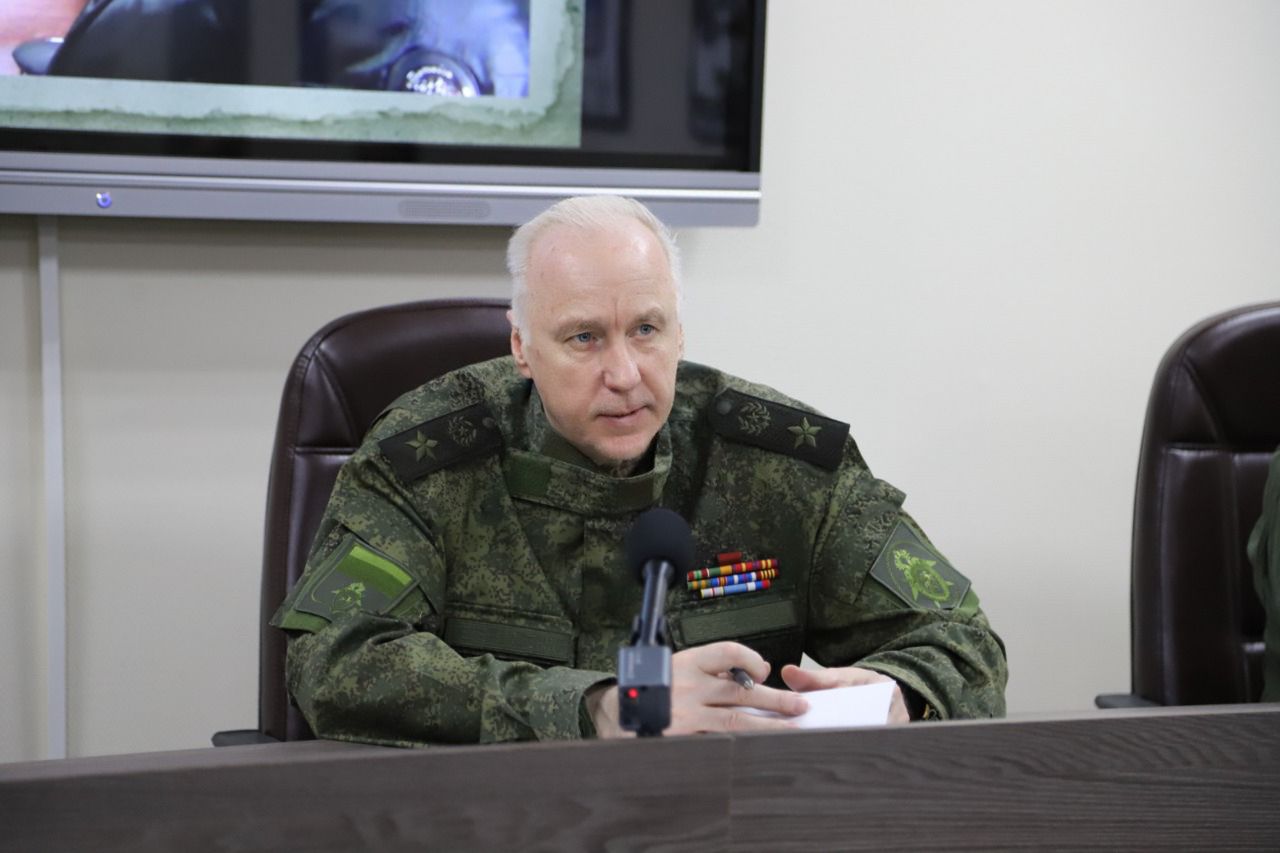
Address of the reception office of the Investigative Committee: Moscow, ul. Pervaya Frunzenskaya, d 3a
Address for writtent applications: 105005, Moscow, Tekhnichesky Pereulok, 2
Address of the reception office of the Investigative Committee: Moscow, ul. Pervaya Frunzenskaya, d 3a
Address for writtent applications: 105005, Moscow, Tekhnichesky Pereulok, 2

During his working trip to Rostov Oblast, Alexander Ivanovich Bastrykin, the Chairman of the Investigative Committee of the Russian Federation, held an operational meeting on the investigation of crimes committed by the Armed Forces of Ukraine against the civilian population of the DPR and LPR. The meeting was attended by Eduard Valeryevich Kaburneev, the First Deputy Chairman of the IC of Russia, top officials and investigators of the Main Investigative Department of the IC of Russia who are part of the investigative group investigating such criminal cases, top officials of the first investigative directorate of the Main Investigative Department of the IC of Russia (based in Rostov-on-Don), the Main Department of Criminalistics of the IC of Russia, as well as the investigative departments of the IC of Russia for Rostov Oblast, Bryansk Oblast, Belgorod Oblast, Voronezh Oblast and Kursk Oblast, as well as the Main Investigative Department of the IC of Russia for the Republic of Crimea and the city of Sevastopol.
During the operational meeting A.I. Bastrykin listened to reports of his subordinates about the progress of the investigation of criminal cases, including those initiated in connection with Ukrainian projectiles directly hitting the territory of the Russian Federation, about the interrogations of people who arrived from the DPR and LPR as part of the investigation. In addition, the situation in the border areas, where shelling by the Armed Forces of Ukraine had been reported, was discussed.
The Deputy Head of the Department for the Investigation of Crimes Related to the Use of Prohibited Means and Methods of Warfare at the MID of the IC of Russia reported that 481 criminal cases on the events in Ukraine and Donbass had been initiated since 2014. Among the persons named in the investigation are representatives of the military and political leadership of Ukraine, members of radical nationalist associations, as well as representatives of the law enforcement agencies of Ukraine; 180 persons are being brought to justice in criminal cases. During the armed conflict in Donbas, at least 5,500 civilians were injured, more than 2,600 people were killed, and more than 2,200 infrastructure facilities were destroyed. The main cause of civilian casualties was shelling by Ukrainian government forces using explosive weapons, small arms and light weapons. Over the entire period of the investigation, more than 146,000 people were interrogated, more than 22,000 people were recognized as victims, including about 2,400 minors. He said that at least 14 hits of projectiles on the territory of Rostov Oblast had been recorded, including the destruction of the premises used by the border control of the FSB of Russia in Rostov Oblast. The IC of Russia initiated criminal cases on these facts. Reports on the first results of the investigation of the recently initiated criminal cases were filed, including the results of inspections of the scenes of incidents and seized parts of exploded Ukrainian shells. Explosive forensic examinations have been secluded and are being carried out. It has been established that the shots were fired from a site controlled by Ukraine.
The head of the IC of Russia received reports that, as of February 24, 2022, more than 105,000 people arrived from Donbass to Russia, more than 6,000 people arrived the territory of Rostov Oblast alone. S.Yu. Kovalev, the acting head of the investigative department for Rostov Oblast, reported on work with refugees. Assistance was provided to everyone, children were sent to kindergartens and schools. Officers of the IC of Russia interrogate those arrived, establish all the facts of the commission of crimes against them. Alexander Ivanovich Bastrykin gave a number of specific instructions, including instructions to promptly complete the investigations. The trial of Ukrainian war criminals, whose victims were civilians, including women and children, must take place.
More specifically, A.I. Bastrykin raised the issue of protecting the rights of children. He instructed all educational institutions of the IC of Russia, including cadet corps and classes, to prepare for the admission of minors who arrived from Donbass. In addition, he pointed out the need to discuss this issue with N.A. Doluda, the ataman of the All-Russian Cossack Society, about the possibility of accepting children from the LPR and DPR for training in the Cossack corps.
Then the head of the IC of Russia visited a temporary accommodation facility for refugees. A.I. Bastrykin personally talked to people. He asked them about the quality of the provided facilities, listened to their questions, which he answered in detail. The Chairman of the IC of Russia turned to the people with a request to help the Russian investigation and give the entire amount of evidence to form the evidence base. “We know the names of the criminals, we have been investigating criminal cases since 2014, but evidence is needed in court, so information from you is needed. I also instructed my subordinates to provide you with all the necessary assistance,” A.I. Bastrykin assured.
Summing up the results of the working trip, the head of the IC of Russia emphasized that genocide is unacceptable, and those responsible for its manifestation will be prosecuted to the fullest extent of the law. He instructed his subordinates to study international experience, as well as to use the methods that are already successfully applied in the investigation of criminal cases of genocide during the Great Patriotic War. In conclusion, A.I. Bastrykin instructed officials to promptly submit an operational plan given the prevailing conditions.
